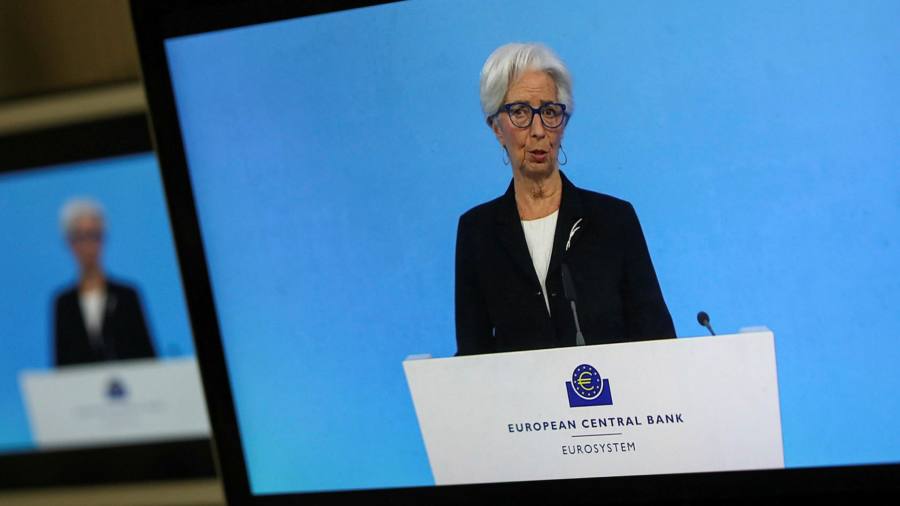[ad_1]
The European Central Bank has promised to accelerate the pace of its bond buying over the next three months in response to the eurozone’s rising borrowing costs and faltering economic recovery from the coronavirus pandemic.
In its latest monetary policy decision, published on Thursday, the central bank kept its main policies unchanged, while announcing that bond purchases under its €1.85tn pandemic emergency purchase programme (PEPP) would be “conducted at a significantly higher pace†in the coming quarter.
The announcement triggered a rally in eurozone bond markets, reassuring investors that the ECB is willing to intervene to limit rises in the cost of finance for governments, businesses and households, which economists worry could derail the single currency bloc’s already-stuttering recovery.
“Based on a joint assessment of financing conditions and the inflation outlook, the governing council expects purchases under the PEPP over the next quarter to be conducted at a significantly higher pace than during the first months of this year,†the ECB said in a statement.
Despite the recent sell-off in bond markets, fuelled by expectations that a sharp US economic recovery will reignite inflation, the ECB had in recent weeks bought fewer bonds through PEPP — triggering doubts about its professed aim of keeping financing conditions “favourableâ€.
Speaking at a press conference after the decision was announced, ECB president Christine Lagarde said higher bond yields could “translate into a premature tightening of financing conditions for all sectors of the economy†that would be “undesirableâ€. She added that there had been “total consensus around the table†at the governing council on the need for a “significant†increase in bond-buying.
After the announcement Italian and German 10-year bonds recovered their losses from the sell-off late last month and hit their highest prices since mid-February.Â
The Italian 10-year bond yield fell to 0.6 per cent, down 0.08 percentage points on the day. The regional benchmark 10-year German Bund yield dropped 0.02 percentage points to minus 0.33 per cent.
The spread between German and Italian 10-year yields, a key measure of political risk, tightened to 0.94 percentage points, down from 0.97 earlier in the day. The euro rose 0.2 per cent against the US dollar.
Lena Komileva, chief economist at G+ Economics, said the ECB’s move represented “an unprecedented pre-commitment as well as a big institutional culture changeâ€, in contrast to the way it had raised interest rates soon after the 2008 financial crisis.
But others were sceptical. Konstantin Veit, a portfolio manager at Pimco, said: “A higher PEPP purchase pace over the next quarter is not a particularly convincing concept, and speaks to a muddle-through compromise of a highly divided governing council, where you risk targeting neither quantities nor prices at the end.â€
The ECB left its deposit rate at minus 0.5 per cent and reiterated that the PEPP could be further expanded or not used in full, depending on its progress in stimulating a recovery in output and inflation.
The ECB has about €1tn of PEPP left to spend; that could last it until the end of this year, even if it increases its weekly purchases to €25bn from an average of €14bn so far in 2021, according to Frederik Ducrozet, strategist at Pictet Wealth Management.
In a sign of how controversial the bond purchases remain in parts of Europe, Die Welt newspaper reported that a fresh legal challenge against PEPP had been filed at the German constitutional court by a group of businessmen and professors. Their last challenge led to a court ruling ordering Germany’s government and central bank to assess the ECB’s actions, but that was resolved last year.
Lagarde said that although eurozone output was likely to contract again in the first quarter, the ECB had increased its growth forecast for the full year from 3.9 to 4 per cent. That did not include the positive spillover effects expected from the US government’s $1.9tn stimulus plan, she added.
“Overall risks surrounding the euro area outlook have become more balanced in the medium term,†she said, although “downside risks remain in the near termâ€.
Inflation had “picked up in recent months†but that was mainly due to “transitory factors and higher energy prices†and it would fall from 1.5 per cent this year to 1.4 per cent in 2023, remaining below the ECB’s target of just under 2 per cent, Lagarde said.
[ad_2]
Source link





